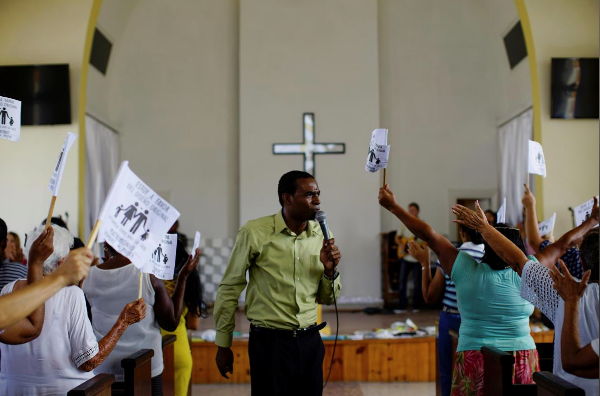Cuban churches fight gay marriage proposal
18 October, 2018

Cuban evangelical churches are collecting signatures to petition against a proposed constitutional amendment that would open the door to gay marriage, as part of an unusually strong nongovernmental political campaign for the Communist-run island.
Cubans have been discussing the broader revamp of their Soviet-era Constitution, as proposed by the Communist Party, at official block-level meetings nationwide since August.
Article 68, which redefines matrimony as gender neutral, has sparked a particular uproar, revealing how macho Cuban society remains despite making headway on lesbian, gay, bisexual and transgender (LGBT) rights in recent years.
Cuba’s churches, which enjoy more autonomy and influence than any other organization not affiliated with the Communist Party after the country expanded religious freedoms in the 1990s, have been stoking the controversy.
“We do not in any way approve Article 68 ... because the Bible condemns it,” Pastor Lester Fernandez, 39, said to euphoric applause from around 500 people gathered at a Methodist Church in Havana one weekday morning earlier this month.
The Methodist Church is one of 21 evangelical denominations that this month started gathering signatures for a petition against the amendment.
They have also been plastering posters celebrating the “original family design, just as God created it” on their doors and windows, surprising many Cubans in a one-party country with tight control of public spaces.
Some analysts say the focus on gay marriage is crowding out discussion of other, more sensitive issues raised by the constitutional revamp, which maintains Cuba’s one-party socialist system as “irrevocable” while reflecting changes of recent years in its 224 articles.
“[Gay marriage] has functioned as a smokescreen to hide other realities,” said Isbel Diaz Torres, an activist for many issues, including LGBT rights.
Diaz Torres said he would be happy to finally be able to marry his boyfriend of 14 years if the Constitution were approved and the necessary legal changes made.
But he wished Cubans would use the public consultation to address other issues like human rights.
The consultation has provoked an unusually open debate for Cuba, with some citizens, for example, calling for direct elections for president. Yet some topics, like the possibility of another political or economic system, appear to remain off-limits.
Cuba persecuted gays in the early decades of Fidel Castro’s 1959 revolution, as it did religious people, rounding them up as counterrevolutionaries and placing them in labor camps.
Castro apologized in 2010 for this, and the country has made strides in LGBT rights in recent years, thanks partly to the advocacy of his niece, Mariela Castro, director of the National Center for Sex Education (CENESEX). Fidel Castro died in 2016.
